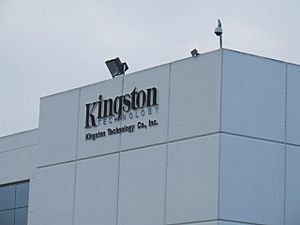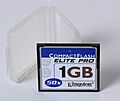Kingston Technology facts for kids
 |
|

Sign at top of Fountain Valley headquarters, pictured in 2007
|
|
| Private | |
| Industry | Computer data storage |
| Founded | 1987 |
| Founders |
|
| Headquarters |
,
United States
|
|
Area served
|
Worldwide |
|
Key people
|
|
| Products | Flash memory cards USB flash drives DIMMs Digital Audio Players SIM cards Solid-state drives |
| Revenue | |
|
Number of employees
|
3,000 (2015) |
Kingston Technology Corporation is a big American company that makes computer parts. They are famous for creating and selling memory products like flash memory and other computer memory. They also had a special division called HyperX for gaming products, which is now owned by another company, HP.
Kingston Technology is based in Fountain Valley, California, in the United States. They have over 3,000 employees around the world. The company has factories and shipping centers in the United States, United Kingdom, Ireland, Taiwan, and China.
Kingston is the largest independent maker of DRAM memory modules. This means they make a lot of the memory chips used in computers. In 2017, they made about 68% of all third-party DRAM memory modules worldwide. In 2018, the company earned $7.5 billion. They were also listed as one of "America's Largest Private Companies" by Forbes magazine. Kingston sells its products to many different customers globally, including stores and other companies that build computers. They also help make parts and manage the supply chain for other electronics companies.
Contents
The Story of Kingston Technology
Kingston Technology started on October 17, 1987. At that time, there was a big shortage of a specific type of memory chip. Two friends, John Tu and David Sun, found a clever solution. John Tu designed a new type of memory module called a single in-line memory module (SIMM). This new design used older, more available parts.
Early Growth and Success
In 1990, Kingston started making products other than memory, like processor upgrades. By 1992, Inc. magazine named Kingston the fastest-growing private company in America. The company then expanded into making networking and storage products. They also introduced portable products like DataTraveler and DataPak. In 1994, Kingston earned an ISO 9000 certification, which shows they have high-quality standards.
In 1995, Kingston opened an office in Munich, Germany. This helped them provide support and marketing for their customers in Europe. In October 1995, Kingston's sales went over $1.3 billion. They even placed ads in newspapers like The Wall Street Journal to thank their employees, suppliers, and distributors.
Big Changes and New Partnerships
On August 15, 1996, a Japanese company called SoftBank bought 80% of Kingston for $1.8 billion. Later that year, Kingston worked with Toshiba to create co-branded memory upgrades for Toshiba PCs. This was the first time a computer maker and a memory maker teamed up like this. In 1999, John Tu and David Sun bought back the 80% of Kingston from Softbank for $450 million.
After the sale to SoftBank in 1996, John Tu and David Sun gave $71.5 million in bonuses to their employees. This meant each of the company's 550 workers received an average of $130,000! Kingston also saw a 49% increase in memory module sales in 1996 compared to 1995.
In 1996, Kingston opened its European headquarters in London, United Kingdom. In January 1997, they opened a factory and office in Taiwan, a sales office in Japan, and another factory and offices in Dublin, Ireland. They also bought more manufacturing buildings in Fountain Valley, California, to make more products in America. Kingston also introduced ValueRAM, which was a high-quality, affordable memory for computer builders. In 1999, Kingston started a sister company called Advanced Validation Labs, Inc. (AVL) to test memory products.
Kingston in the 2000s
Kingston had a division for removable disk drive storage products, which started in 1989. In 2000, this division became a separate company called StorCase Technology, Inc. StorCase stopped operating in 2006. In June 2000, Kingston changed how they managed their memory manufacturing process. They created Payton Technology Inc. to help with this new system.
Forbes magazine listed Kingston as number 141 on its list of "The 500 Largest Private Companies in the U.S." in 1999. In March 2001, Kingston created a new division called the Consumer Markets Division (CMD). This division focused on selling products directly to customers through stores and online.
In 2002, Kingston launched a special memory tester and a new line of high-performance memory modules called HyperX. They also patented a new chip-stacking technology. In August 2002, Kingston invested $50 million in Elpida Memory and started a "green initiative" for making memory modules.
In 2004, Kingston announced new DataTraveler Elite USB drives. These drives had special hardware security to keep data safe. Advanced Micro Devices (AMD) also named Kingston an "Outstanding Partner" for their help with new AMD processors. Kingston continued to grow, with revenues reaching $2.4 billion in 2004. They launched validated ValueRam modules for Intel-based servers. The company also received a U.S. patent for a special tester for server memory. They invested $26 million in Tera Probe, a large company that tests wafer chips. Kingston also opened the world's largest memory module manufacturing facility in Shanghai, China.
In 2006, Kingston introduced the first fully secure USB drive with 128-bit hardware encryption, later upgraded to 256-bit. This made sure data on the drive was completely private. They also launched Fully Buffered DIMMs (FBDIMMs), which allowed for more than 16 GB of memory. Kingston also entered the portable media market with KPEX (Kingston Portable Entertainment eXperience).
Kingston continued to be recognized for its growth. In 2007, Forbes listed Kingston as No. 83 on its list of "The 500 Largest Private Companies in the U.S." Inc. magazine also ranked Kingston as the No. 1 Fastest Growing Private Company by Revenue.
Kingston in the 2010s
Kingston continued to be a top memory manufacturer. From 2009 to 2013, iSuppli (a market research firm) consistently ranked Kingston as the world's number-one memory module manufacturer for the third-party market. This means they were the biggest independent maker of memory modules for many years in a row.
In 2011, Kingston launched the Wi-Drive line of wireless storage products. Forbes ranked Kingston as the 51st largest private company in the US. Gartner Research also ranked Kingston as the No. 1 USB drive manufacturer in the world.
In 2012, Kingston celebrated 25 years in the memory business. They also celebrated 10 years of their HyperX gaming memory. Kingston released HyperX branded SSD drives and the first Windows to Go USB drive.
In 2013, Kingston shipped its fastest and largest-capacity USB 3.0 Flash Drive, the DataTraveler HyperX Predator 3.0, which could hold up to 1 TB of data. They also launched the MobileLite Wireless reader line for smartphones and tablets.
In 2014, Kingston's HyperX brand released the FURY memory line for gamers and people who like to "overclock" their computers (make them run faster). HyperX also released its Cloud headset. HyperX even set a world record for DDR3 overclocking at 4620 MHz. Kingston also started shipping M.2 SATA SSDs for new laptops and motherboards. They released MobileLite Wireless G2, a second-generation media streamer.
In 2015, HyperX continued to break records, reclaiming the top DDR4 overclocking mark at 4351 MHz. They launched high-performance PCIe SSDs and an improved Cloud II headset with virtual 7.1 Surround Sound. HyperX also created the world's fastest DDR4 128GB memory kit. Gartner ranked Kingston as the No. 2 aftermarket PC SSD manufacturer in the world for 2014.
In 2016, Kingston Digital, which handles Kingston's Flash memory, bought the USB technology from IronKey. This helped Kingston improve its secure USB drives.
In June 2021, Kingston Technology sold its HyperX gaming division to HP Inc. for $425 million. This deal only included the gaming accessories like headsets and keyboards. Kingston still owns the memory and storage products that were part of HyperX, and they have renamed these products to Kingston FURY.
Awards and Recognition
Kingston Technology has received many awards and recognitions over the years.
- iSuppli (IHS) ranked Kingston as the world's number-one memory module manufacturer for the third-party memory market for 12 years in a row, most recently in June 2015.
- In 2007, Inc. magazine gave Kingston Technology's founders a special award called the Inaugural Distinguished Alumni Goldhirsh Award.
- In September 2006, Kingston received Intel's "Outstanding Supplier Award" for their excellent support, quality, and timely delivery of FB-DIMM products.
- In April 2003, Kingston received the "Diverse Supplier Award for Best Overall Performance" from Dell.
- The company was also honored for "Excellence in Fairness" by the Great Place to Work Institute.
- Kingston appeared on Fortune magazine's list of "100 Best Companies to Work For" for five years in a row (1998–2002).
- In 2001, IndustryWeek listed Kingston as a "Top 5 Global Manufacturing Company."
- Forbes magazine ranks Kingston as number 51 on its list of America's Largest Private Companies.
- The HyperX line of products was very popular and used by over 20% of professional gamers.
Kingston Products
Kingston makes many different products that help computers and other devices work better.
- Computer Memory: They make memory upgrades for specific computer systems and ValueRAM for computer builders.
- Digital Audio Players: These include devices like the K-PEX 100, and small memory cards like Mini-Secure Digital and Micro-Secure Digital.
- Flash Memory: This is a big part of their business. They make Secure Digital cards, Compact Flash cards, USB Flash Drives, Solid-state drives (SSDs), and other types of flash memory.
- Mobile Phone Memory: They make Mini-Secure Digital, Micro-Secure Digital, and MMC cards for phones.
- Printer Memory: Kingston also makes memory upgrades for printers, including LaserJet and Lexmark printers.
- Server Memory: They provide memory for both branded servers (like IBM and HP) and custom-built servers.
- Wireless Storage Products: These include devices like the Wi-Drive wireless storage and MobileLite Wireless readers, which let you access files wirelessly.
Images for kids
-
A Kingston USB flash drive with 8 GB capacity
-
A Kingston CompactFlash card with 1 GB capacity
-
A 2 NVMe M.2 solid state drive
See also
 In Spanish: Kingston Technology para niños
In Spanish: Kingston Technology para niños
 | Isaac Myers |
 | D. Hamilton Jackson |
 | A. Philip Randolph |




